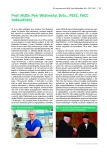-
Medical journals
- Career
Treatment of hypertension may affect the incidence of dementia?
Authors: Miroslav Souček 1,2
Authors‘ workplace: II. interní klinika LF MU a FN u sv. Anny Brno, přednosta prof. MUDr. Miroslav Souček, CSc. 1; Mezinárodní centrum klinického výzkumu FN u sv. Anny Brno, ředitel Gorazd B. Stokin, M. D., MSc., Ph. D. 2
Published in: Vnitř Lék 2014; 60(4): 354-358
Category: 60th Birthday - prof. MUDr. Petr Widimský, DrSc., FESC, FACC
Overview
High blood pressure is one of the main risk factor for developing dementia in high age. The connection between treatment of hypertension and reduced risk of cognitive impairment has been studied. Clinical trials have shown reduced risk of dementia after hypertension treatment. Efficacy of antihypertensive drugs varies in their impact on the incidence of dementia. Dementia together with higher life expectancy and prevalence of systolic hypertension will be real issue not only for health care in the near future. Primary and secondary prevention of dementia might be affected by hypertension treatment. Recently, it has been studied possible influence of subclinical damage by hypertension.
Key words:
dementia – hypertension – primary and secondary prevention – subclinical organ damage
Sources
1. SHEP Cooperative Research Group. Prevention of stroke by antihypertensive drug treatment in older persons with isolated systolic hypertension. Final results of the Systolic Hypertension in the Elderly Program (SHEP). JAMA 1991; 265(24): 3255–3264.
2. Medical Research Council trial of treatment of hypertension in older adults: principal results. MRC Working Party. Brit Med J 1992; 304 (6824): 405–412.
3. Staessen JA, Fagard R, Thijs L et al. for the Systolic Hypertension-Europe (Syst-Eur) Trial Investigators. Morbidity and mortality in the placebo-controlled European Trial on Isolated Systolic Hypertension in the Elderly. Lancet 1997; 360 : 757–764.
4. Forette F, Seux ML, Staessen JA et al. The prevention of dementia with antihypertensive treatment: new evidence from the Systolic Hypertension in Europe (Syst-Eur) study. Arch Intern Med 2002; 162(18): 2046–2052.
5. Bulpitt CJ, Beckett NS, Cooke J et al (on behalf of Hypertension in the Very Elderly Trial HYVET) Working Group. Results from the pilot study for Hypertension in the Very Elderly Trial. J Hypertens 2003; 21(12): 2409–2417.
6. Peters R, Beckett N, Forette F et al (HYVET investigators). Incident dementia and blood pressure lowering in the Hypertension in the Very Elderly Trial cognitive function assessment (HYVET-COG): a double-blind, placebo controlled trial. Lancet Neurol. 2008; 7(8): 683–689.
7. Tzourio C1, Anderson C, Chapman N et al (PROGRESS Collaborative Group). Effects of blood pressure lowering with perindopril and indapamide therapy on dementia and cognitive decline in patients with cerebrovascular disease. Arch Intern Med 2003; 163(9): 1069–1075.
8. Schrader J, Luders S, Kulschewski A et al (the MOSES study group). Morbidity and Mortality After Stroke, Eprosartan Compared With Nitrendipine for Secondary Prevention: principal results of a prospective randomized controlled study (MOSES). Stroke 2005; 36(6): 1218–1226.
9. Snowdon DA, Greiner LH, Mortimer JA et al. Brain infarction and the clinical expression of Alzheimer disease. The Nun Study. JAMA 1997; 277(10): 813–817.
10. Dufouil C, Chalmers J, Coskun O et al. Effect of blood pressure lowering on cerebral white matter hyperintensities in patients with stroke: the PROGRESS (Perindopril Protection Against Recurrent Stroke Study) magnetic resonance imaging substudy. Circulation 2005; 112(11): 1644–1650.
Labels
Diabetology Endocrinology Internal medicine
Article was published inInternal Medicine

2014 Issue 4-
All articles in this issue
- Professor Petr Widimský, MD, DSc, FESC, FACC, sixty-year old
- Development of interest of pulmonary hypertension in the Czech Republic
- 30 years heart transplantation program in Institute for Clinical and Experimental Medicine in Prague
- Drug therapy of pulmonary arterial hypertension in 2014
- Unusual intervention of native vessel in patient with coronary artery bypass
- Optical coherence tomography, delayed stent implantation and primary percutaneous coronary intervention in patients with myocardial infarction and ST segment elevation
- Liver in heart failure
- Mitral stenosis
- Treatment of heart failure in diabetic patients
- The role of learning curve on the results of aortic valve implantation for severe aortic stenosis
- Fully absorbable drug eluting coronary stent: where do we stand in 2014?
- Impact of galectin 3 as myofibrosis marker in clinical cardiology
- Surgical therapy of myocardial infarction
- Operation of Ebstein anomaly in adulthood – our experience
- Preclinical cardiovascular diseases and aortic stiffness
- Acute heart failure and cardiogenic shock – trends at the beginning of 21st century
- Treatment of hypertension may affect the incidence of dementia?
- Right ventricle in severe pulmonary hypertension in congenital heart defects – different and specific.
- Comparison of American and European (Czech) guidelines for diagnosis and treatment of chronic heart failure
- Detection of vulnerable atherosclerotic plaque with near-infrared spectroscopy: a systematic review
- Catheter renal denervation in treatment of resistant hypertension: reality or fiction?
- Practical questions on therapy with new antithrombotic agents
- Combination therapy of hypertension
- Internal Medicine
- Journal archive
- Current issue
- Online only
- About the journal
Most read in this issue- Liver in heart failure
- Right ventricle in severe pulmonary hypertension in congenital heart defects – different and specific.
- Operation of Ebstein anomaly in adulthood – our experience
- Mitral stenosis
Login#ADS_BOTTOM_SCRIPTS#Forgotten passwordEnter the email address that you registered with. We will send you instructions on how to set a new password.
- Career

